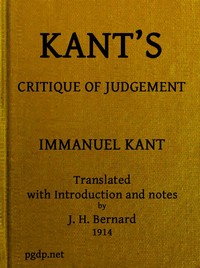Kant's Critique of Judgement by Immanuel Kant
"Kant's Critique of Judgement" by Immanuel Kant is a philosophical work published in 1790. The third in Kant's critical trilogy, it bridges his earlier investigations of knowledge and morality by exploring the nature of judgment itself. Divided into aesthetic and teleological sections, the work examines how we make judgments about beauty, the sublime, and purpose in nature. Kant introduces the concept of "subjective universal" judgments, revealing how aesthetic experiences claim validity beyond
personal preference while resisting absolute determination. (This is an automatically generated summary.)
Read or download for free
| How to read | Url | Size | |||
|---|---|---|---|---|---|
| Read now! | https://www.gutenberg.org/ebooks/48433.html.images | 930 kB | |||
| EPUB3 (E-readers incl. Send-to-Kindle) | https://www.gutenberg.org/ebooks/48433.epub3.images | 475 kB | |||
| EPUB (older E-readers) | https://www.gutenberg.org/ebooks/48433.epub.images | 478 kB | |||
| EPUB (no images, older E-readers) | https://www.gutenberg.org/ebooks/48433.epub.noimages | 390 kB | |||
| Kindle | https://www.gutenberg.org/ebooks/48433.kf8.images | 731 kB | |||
| older Kindles | https://www.gutenberg.org/ebooks/48433.kindle.images | 648 kB | |||
| Plain Text UTF-8 | https://www.gutenberg.org/ebooks/48433.txt.utf-8 | 826 kB | |||
| Download HTML (zip) | https://www.gutenberg.org/cache/epub/48433/pg48433-h.zip | 419 kB | |||
| There may be more files related to this item. | |||||
Similar Books
About this eBook
| Author | Kant, Immanuel, 1724-1804 |
|---|---|
| Translator | Bernard, J. H. (John Henry), 1860-1927 |
| Uniform Title | Kritik der Urteilskraft. English |
| Title | Kant's Critique of Judgement |
| Note | Wikipedia page about this book: en.wikipedia.org/wiki/Critique_of_Judgment |
| Credits |
Produced by Charlie Howard and the Online Distributed Proofreading Team at www.pgdp.net (This file was produced from images generously made available by The Internet Archive) |
| Reading Level | Reading ease score: 38.3 (College-level). Difficult to read. |
| Language | English |
| LoC Class | B: Philosophy, Psychology, Religion |
| Subject | Judgment (Logic) |
| Subject | Judgment (Aesthetics) |
| Subject | Teleology |
| Category | Text |
| EBook-No. | 48433 |
| Release Date | Mar 8, 2015 |
| Most Recently Updated | Oct 24, 2024 |
| Copyright Status | Public domain in the USA. |
| Downloads | 3336 downloads in the last 30 days. |
| Project Gutenberg eBooks are always free! | |

